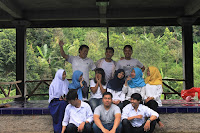I want to tell you about my experience along with an assistant
"basic accounting Laboratory" in “makrab akdas segar”
The first day, we all gathered at the university campus Gunadarma e before we leave campus to go to the villa there we took a picture together beforehand
after arriving at the villa .we held a briefing for all participants to divide into groups and then
participants were given time for a break for prayer and lunch
we did have lunch together with the participants
After lunch, the participants played a game with the senior, when the game I felt very happy to see them the participants look very happy
at night we held a sharing with the seniors, where we shared our stories to the junior about our
experience in Akdas, campus,and others
The second day, after breakfast participants play a game called "Marathon game" in which the game
consists of 5 games at once
.
besides "gaming marathon" we did play in the water and after that we played together in
the swimming pool
at night, we held share Akdas with alumni who already have a lot of experience, they sharing their
work experiences and give us the motivation to work, tips to make research of skripsi
and many more
Last day (Third day), we took a photo together as memories makrab
and we are "Basic Accounting Laboratory"





























